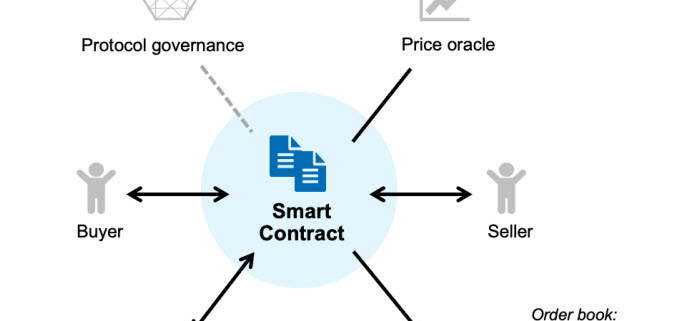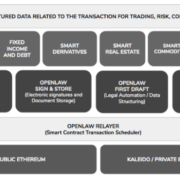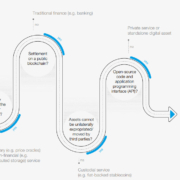DeFi Beyond the Hype
The Emerging World of Decentralized Finance
Produced by the Wharton Blockchain and Digital Asset Project, in collaboration with the World Economic Forum
Introduction
Decentralized Finance (DeFi) is a developing area at the intersection of blockchain, digital assets, and financial services. DeFi protocols seek to disintermediate finance through both familiar and new service arrangements. The market experienced explosive growth beginning in 2020. According to tracking service DeFi Pulse, the value of digital assets1 locked into DeFi services grew from less than $1 billion in 2019 to over $15 billion at the end of 2020, and over $80 billion in May 2021.2 Yet DeFi is still early in its maturation.
The goal of this report is to demystify DeFi. It describes the basic attributes of DeFi services, the structure of the DeFi ecosystem, and emerging developments. A forthcoming Decentralized Finance Policy-Maker Toolkit will offer guidance on risks and policy approaches for governments navigating this new space.
DeFi is a general term covering a variety of activities and business relationships. We identify six major DeFi service categories—stablecoins, exchanges, credit, derivatives, insurance, and asset management—as well as auxiliary services such as wallets and oracles. While traditional finance relies on intermediaries to manage and process financial services, DeFi operates in a decentralized environment—public, permissionless blockchains.
Services are generally encoded in open-source software protocols and smart contracts. Like blockchain technology more generally, DeFi has an enthusiastic base of evangelists, who promote its potential for efficiency, transparency, innovation, and financial inclusion. It also has its critics, risks, and unknowns. There have already been significant examples of fraud, attacks, governance controversies, and other failures in the DeFi world. At this early stage, it is essential for industry and governments alike to develop a well-informed and nuanced understanding of the opportunities, risks, and challenges.
What is DeFi?
THE FUNDAMENTALS
DeFi is a general term for decentralized applications (Dapps) providing financial services on a blockchain settlement layer, including payments, lending, trading, investments, insurance, and asset management. DeFi services typically operate without centralized intermediaries or institutions, and use open protocols that allow services to be programmatically combined in flexible ways.
Historically, intermediaries have played essential roles within financial markets, serving as agents and brokers of trust, liquidity, settlement, and security. The range and value of intermediaries has grown over time to meet the needs of an increasingly complex financial system. Since the 2008 Global Financial Crisis, there has been increased attention on inefficiencies, structural inequalities, and hidden risks of the intermediated financial system. More recently, controversies such as the GameStop short squeeze, in which retail investors were blocked from trading during a period of volatility, cast a spotlight on other shortcomings of legacy financial infrastructure:
slow settlement cycles, inefficient price discovery, liquidity challenges, and the lack of assurance around underlying assets.
DeFi aims to address some of these challenges—though many still apply to the DeFi ecosystem in its current state.
DeFi leverages blockchain technology to facilitate alternatives to traditional service providers and market structures. It offers the potential for innovation and creation of new services for improving efficiency of financial markets—building upon work being done in financial technology (fintech) and blockchain technology more broadly. Whether it achieves this promise remains to be seen…
Download the full report:
https://wifpr.wharton.upenn.edu/wp-content/uploads/2021/05/DeFi-Beyond-the-Hype.pdf





Hinterlasse einen Kommentar
An der Diskussion beteiligen?Hinterlasse uns deinen Kommentar!